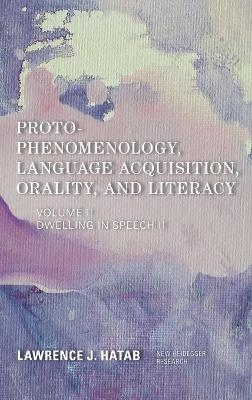
Proto-Phenomenology, Language Acquisition, Orality and Literacy
Rowman & Littlefield International (Verlag)
978-1-78661-398-1 (ISBN)
How is it that sounds from the mouth or marks on a page—which by themselves are nothing like things or events in the world—can be so world-disclosive in such an automatic manner? In this fasincating and important book, Lawrence J. Hatab presents a new vocabulary for Heidegger's early phenomenology of being-in-the-world and applies it to the question of language. He takes language to be a mode of dwelling, in which there is an immediate, direct disclosure of meanings, and sketches an extensive picture of proto-phenomenology, how it revises the posture of philosophy, and how this posture applies to the nature of language. Representational theories are subordinated to a presentational account of immediate disclosure in concrete embodied life. The book critically addresses standard theories of language, such that standard questions in the philosophy of language are revised in a manner that avoids binary separations of language and world, speech and cognition, theory and practice, realism and idealism, internalism and externalism. The phenomenological analysis is also situated in child development, language acquisition, and the difference between oral and written forms of language.
Lawrence J. Hatab is Louis I. Jaffe Professor of Philosophy at Old Dominion University. He is the author of Nietzsche’s On the Genealogy of Morality (2008), Nietzsche’s Life Sentence: Coming to Terms With Eternal Recurrence (2005), Ethics and Finitude: Heideggerian Contributions to Moral Philosophy (2000), A Nietzschean Defense of Democracy: An Experiment in Postmodern Politics (1995) and Myth and Philosophy: A Contest of Truths (1990).
Preface
Introduction
Chapter 1: Proto-Phenomenology and Language: A Summary of Volume I
1. Proto-Phenomenology and the Lived World
2. The Personal-World
3. The Environing-World
4. The Social-World
5. Projection
6. Temporality
7. Embodiment
8. Disclosure and Interpretation
9. Language
10. Truth and Pluralism
Chapter 2: The Child's World
1. Ecstatic Dwelling
2. The Personal-Social-World
3. The Environing-World
4. Affective Attunement
5. Projection
6. Temporality and History
7. Embodiment
8. On the Way to Language
Chapter 3: Language Acquisition
1. Natural Language
2. The Phenomenological Priority of Language
3. Language Learning and Dwelling
4. The Personal-Social-World
5. Embodiment and the Environing-World
6. Temporality and History
7. Differential Fitness, Development, and Truth
8. Summary
Chapter 4: Orality and Literacy
1. Oral and Written Language: Two Different Worlds?
2. The Alphabet and Learning How to Read and Write
3. Orality in Ancient Greece
4. Elements of Orality and Literacy
5. Proto-Phenomenology and Literacy
Chapter 5: Philosophy and Literacy in the Greek World
1. Greek Myth
2. The Homeric World
3. The Advent of Philosophy
4. Plato and the Poets
5. Literacy and Philosophy
6. Plato and Writing
7. Some Effects of Literacy in Greek Philosophy
Chapter 6: The Transcribed World
1. From Greek to Latin
2. The Evolution of Literacy
3. Print
4. Science and the Book of Nature
5. Representation and Subjectivity
6. Literal and Metaphorical Language
7. A Post-Literate World?
8. Concluding Remarks
Glossary
Bibliography
Index
| Erscheinungsdatum | 12.11.2019 |
|---|---|
| Reihe/Serie | New Heidegger Research |
| Verlagsort | London |
| Sprache | englisch |
| Maße | 159 x 233 mm |
| Gewicht | 671 g |
| Themenwelt | Geisteswissenschaften ► Philosophie ► Allgemeines / Lexika |
| Geisteswissenschaften ► Philosophie ► Philosophie der Neuzeit | |
| Geisteswissenschaften ► Philosophie ► Sprachphilosophie | |
| ISBN-10 | 1-78661-398-0 / 1786613980 |
| ISBN-13 | 978-1-78661-398-1 / 9781786613981 |
| Zustand | Neuware |
| Informationen gemäß Produktsicherheitsverordnung (GPSR) | |
| Haben Sie eine Frage zum Produkt? |
aus dem Bereich


